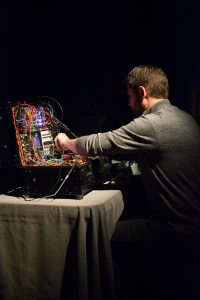
From the January 2020 Desktop News | Dr. Andrew Raffo Dewar, an associate professor in New College and the School of Music, was recently awarded the Robert M. Stevenson Prize by the Society for Ethnomusicology for his 2018 experimental opera, “Volver.”
The award is the highest honor given by the society to a composer, and is presented biennially to a composer who is also an ethnomusicologist for the creation of an original musical work.
The piece was commissioned by Experiments in Opera, a New York-based non-profit that seeks to redefine what is thought of as “opera” by incorporating new media and exploring collaborations between different types of artists. Dewar’s only requirement from Experiments in Opera was that he uses voice and a modular synthesizer to tell a story—the rest was up to him.
Dewar’s opera is inspired by Francisco E. Balderrama’s book “A Decade of Betrayal” about the 1930s return of Mexican-Americans to Mexico. “Volver” explores the stories of two Mexican-Americans who were deported to Mexico, one of whom was a citizen born in the US, and a mid-level bureaucratic official for Los Angeles County who participated in returning Mexican-Americans to Mexico. Instead of having singers perform the text of the interviews, Dewar uses the original recordings collected by scholar Christine Valenciana in the early 1970s.
“There’s so much character in the original voices that it seemed a shame not to make them the centerpiece because they’re so rich and interesting,” Dewar said. “The people speaking actually went through what they’re talking about–and I think that has an impact.”
While the story unfolds, a mysterious figure observes from the back of the stage, responding in indistinguishable sounds to the conversation. Electronic music from a synthesizer adds to this, entirely derived from and controlled by the sounds of both the interview recordings and the singer, which allows the piece to be slightly different each time it is performed.
Dewar hopes to expand the piece in the near future, whether that’s lengthening it into a one-act opera, including a small orchestra, or adding more visual elements to enhance the story.
To watch Dewar’s award-winning opera, click here.